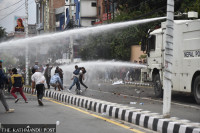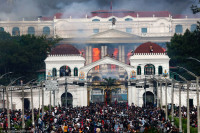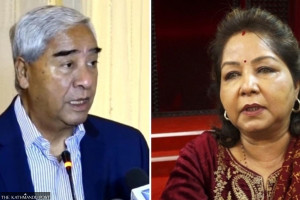Opinion
Impeachment or revenge?
Elected legislative representatives must use their power properly and for the good of the people
Shyam Kc
The registration of an impeachment motion against the sitting Chief Justice (CJ) of the Supreme Court (SC) was a direct offense to the time tested theory of separation of powers, as practised in western democratic systems. In such political systems, the elected legislative representatives are considered sovereign, as they represent the people. This entails that these elected representatives are supreme in their legal authority. But such power has to be used properly and for the good of the people; it must not go against the very grains on which democracy, as it is currently understood the world over, is based. The impeachment motion against the CJ was registered with signatures from 249 members belonging to two major political parties in the legislative assembly. Almost 190 signatories were Nepali Congress (NC) members, indicating that the NC led this act of dissension.
Tyrannical tendencies
General belief has it that the NC was dissatisfied by the SC’s decision to nullify the government’s appointment of a certain Deputy Inspector General of Policy (DIGP) to the position of the Inspector General of Police (IGP). There is also a conjecture that the DGIP has ties with the NC, and more specifically, the NC President, as they both hail from west Nepal. The support of the CPN (Maoist Centre) was ensured by the fact that the NC saw fit to back the Maoist Centre as the head of the present government.
This is not the first time that an impeachment motion has been registered in Parliament. Normally a rare occurrence, this motion was also lodged against the former chief of the Commission for Investigation of Abuse of Authority (CIAA). Before the impeachment against the CIAA chief could be brought to the House floor, the SC ruled that the CIAA chief did not meet the minimum requirements for such a high constitutional office and he was automatically stripped of the post he held. But unlike the impeachment motion against the former CIAA chief, this time the case is much more serious. It indicates the tyrannical tendencies of the major political parties.
It was a tyrannical move, as the person against whom the impeachment motion is directed is the head of the judiciary, one of the three main branches of the state. Our political parties must realise that disturbing the balance of power between the judiciary, legislature and executive bodies of government only complicates a situation that is already tense. This could herald the death of western style democracy in Nepal. No wonder a large number of people took to the streets to protest the ill-timed and ill thought out move of the two major parties in the Legislature Parliament. However, in this over-crowded 601-member legislature, not all political parties are toeing the NC-Maoist Centre line. The United Marxist Leninist (UML) and the Rastriya Prajatantra Party (RPP), the second and fourth largest parties in the assembly, are opposed to the move. The RPP, in fact, has pulled out of the government in protest of the impeachment motion.
Destruction of democratic values
This recent impeachment process can be traced back to the previous attempt to impeach the CIAA chief. Though students and youth leaders took to the streets in support of the impeachment motion against the CIAA chief, it must not be forgotten that most of the protests against the CIAA chief were carried out by those who were directly or indirectly aligned with the political parties. Because a section of the media and those aligned with political parties were in total support of the CIAA impeachment motion, there was a general feeling that the move was politically motivated.
It is a common perception that the CIAA was trying to investigate corrupt practices in political parties. When the SC ruled the CIAA head as being unqualified for the post, logically, those who were responsible for recommending him for the post should have been questioned. But this never happened. It seems that in Nepal’s democratic system, those who are really responsible for misdeeds and deliberately distort the system can get away freely as long that they have political backing. Transparency is something that is found only in dictionaries; it is hardly ever found in the democratic systems of developing countries where political leaders are virtually elected tyrants. It is strange that the Maoist Centre-led government in 2009 did not lodge an impeachment motion against the then President of the country, Ram Baran Yadav, after he shielded and reinstated the Chief of Army Staff, Rookmangud Katawal, following his dismissal by the government. After all, in any democracy, the Army is under the government’s control. Instead of bringing to book the one responsible for the deviation from general democratic practice, the then prime minister Pushpa Kamal Dahal quit the office himself.
But this time, the impeachment motion is a serious and unforgivable step towards the destruction of the most basic of democratic values. The SC ruling on the appointment of the IGP was something that was long needed. Any government official, from the lowest ranking to the highest official, must be guided by their duty and dedication to the people. All officials have to be people oriented and the assessment of their performance must be based on their people oriented activities and how well they perform their duty. Appointing political party members and leaders to regular government posts through the officials’ nexus can only result in making such officials the puppets of political parties. This kind of appointment should be avoided in emerging democracies. The SC’s ruling on the IGP case has only brought this fact to the fore. This needs to be a lesson to the political parties who tend to think that government officials are their servants, rather than officials who work for the betterment of the people. No wonder the people are wondering whether the impeachment process—that will have far reaching ramifications—is an act of revenge initiated by the two ruling parties.




 19.45°C Kathmandu
19.45°C Kathmandu










